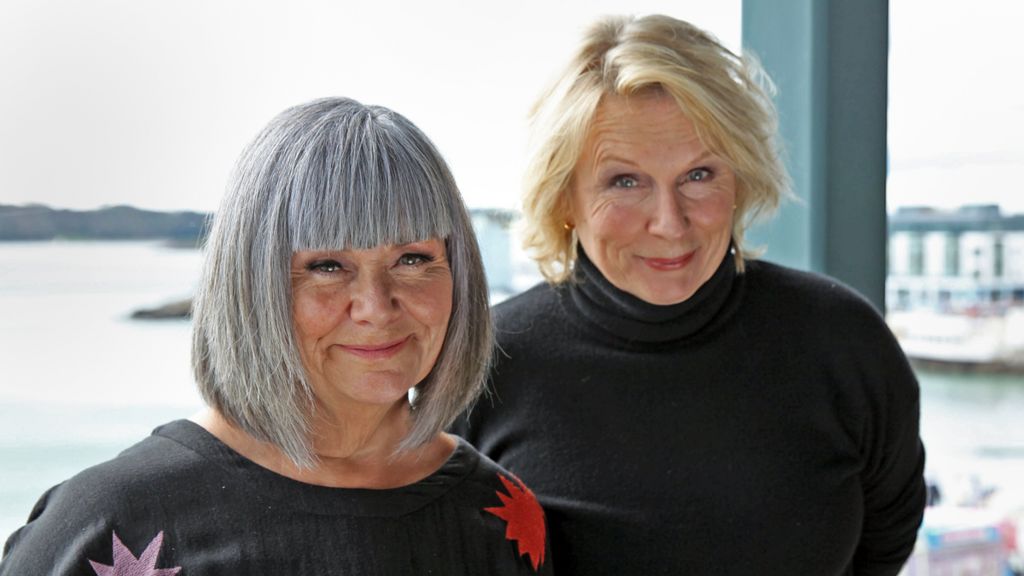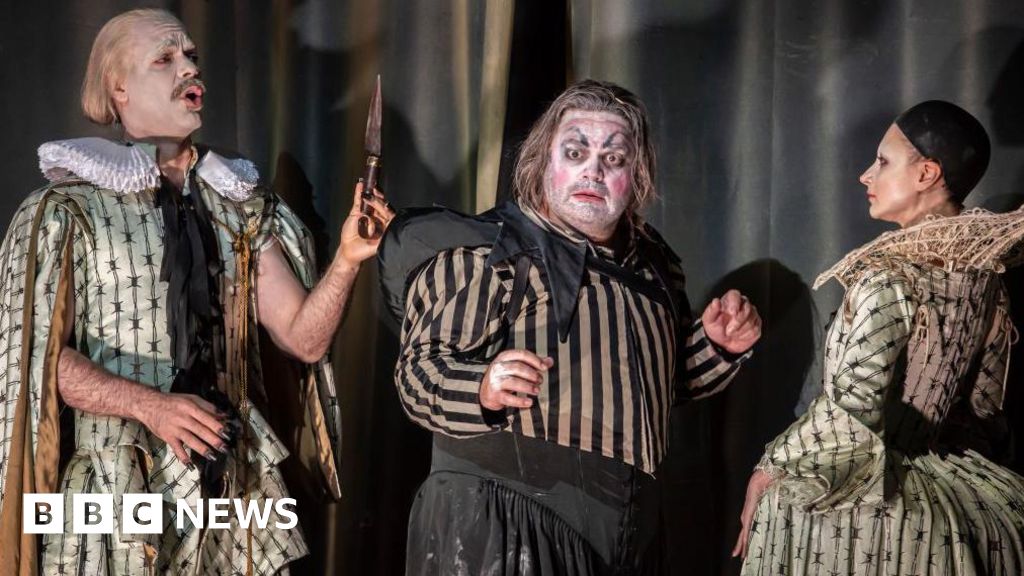ARTICLE AD BOX
 Image source, BBC Studios
Image source, BBC Studios
Dawn French and Jennifer Saunders have been amusing us for over 40 years
"We never talked about being feminists, we just were," says Dawn French.
With their satirical and goofy routines - farcical and ludicrous - she and partner, Jennifer Saunders, helped transform the comedy landscape for women in the UK.
"Doing our job was being a feminist. That was the point of it really," says French in a new BBC documentary about their partnership.
When they first started out in the late 1970s, the comedy scene was a world away from today. For a start, it was predominantly male. Old school stand-up comedians such as Bernard Manning, whose routines would now be considered controversial, were mainstream.
The comedy circuit was very male when the pair began performing together
"When I was growing up, the women [on-screen] were either bikini-clad babes, or not very attractive mother-in-laws, and were the butt of jokes, rather than telling the joke," says actor and director, Kathy Burke, who appeared with French and Saunders on their sketch show.
The duo's agent of more than 40 years, Maureen Vincent, says many of the TV executives who made decisions about what programmes and performers appeared on our TV screens thought women weren't funny "and were actually heard to say so".
"Most of the comedic women were playing supporting roles to men in sitcoms."
Image source, Alamy
Image caption,In the driving seat - French as Thelma and Saunders as Louise, in their parody of the famous road-trip movie
But, as the 1980s edged into view, French and Saunders - plus other women such as Pamela Stephenson and Victoria Wood - began to change establishment thinking. They showed that women could stand alone, or as a double act, and be funny and popular.
'I think she found me quite annoying'
French and Saunders had both wanted to be drama teachers when they met at the Central School of Speech and Drama in 1978.
"I remember thinking she looked quite old-fashioned in a funny way and quite grown-up because she arrived and she was ready," says Saunders.
"I arrived [at] the other end of the scale, completely unformed and unready."
Image source, Jennifer Saunders
Image caption,In the late 1970s, French and Saunders would dress up as punks and try to scare people
French's first impression of Saunders was that she was beautiful, elegant and posher than she was.
"I think she found me quite annoying," she says. "I talked a lot. I thought she was wondrous but I didn't think we ever were going to be chums."
Sharing a flat together, however, made them realise they had the same sense of humour and same boredom threshold, so they invented fun and pranks, says Saunders.
"We'd dress up as punks and go on the tube and see if we could frighten anybody and we'd shout things to people on the street."
French and Saunders in their 2002 parody of The Lord of the Rings
The pair began to perform sketches at the actors' cabaret at drama school. Sketches like the Menopazzi Sisters - an acrobatic act that wasn't that acrobatic. The duo wore red swimming caps and leotards with nipple tassels on their back, because they'd put their costumes on the wrong way round.
But it was in 1980, at a comedy show in a strip club in London's Soho, that French and Saunders first began to break down stereotypes.
'Girls on Top'
They joined "The Comic Strip", a group of comedians described as "alternative" at the time - the likes of Alexei Sayle, Adrian Edmondson, Rik Mayall, Nigel Planer and Peter Richardson.
"I think they were embarrassed that they didn't have any women," says French.
"They were trawling for them, so they couldn't believe their luck when a couple of big-bosomed girls walked in."
"Most women liked to preserve their vanity, and they had none of it," says Adrian Edmondson - Jennifer Saunders' husband
Not many women at that time were doing this "British, taking the piss out of themselves, being the idiots" style of comedy, says Edmondson, who is married to Saunders.
"Most women liked to preserve their vanity, and they had none of it," he says. "That was the shock."
But French thought the two of them were in the wrong place at first. The satirical Comic Strip had begun to attract a lot of attention for being political, she says, whereas they were just coming up with whatever funny characters they could think of.
"But being there at that time, being women in an equal role to the guys, was political in itself," she adds.
Image source, Alamy
Image caption,The "Girls on Top" (minus Tracey Ullman) - pictured (l-r) Jennifer Saunders, Joan Greenwood, Katherine Helmond, Ruby Wax and Dawn French
By 1982, the Comic Strip had made the transition to television and French and Saunders featured on the launch night of Channel 4. They would go on to co-write and star in the ITV sitcom Girls on Top, with Ruby Wax and Tracey Ullman in 1985, and were given their own sketch show on BBC Two in 1987.
Girls on Top was billed as the female version of the BBC's anarchic house-sharing student comedy The Young Ones - which featured Edmondson, Mayall, Planer and Sayle. But the women encountered push-back over certain words in their scripts. "Menstruation" had not been heard much on primetime TV up to that point.
"We weren't being shocking, that's just the way we speak," says Ruby Wax. "We weren't trying to break any walls down, that's just who we were."
'My shape is who I am'
On their BBC sketch shows, French and Saunders became famous for their Hollywood parodies. Films such as Kill Bill, Gentlemen Prefer Blondes, Titanic, and Thelma and Louise all received the French and Saunders spoof treatment.
Image source, Alamy
Image caption,"My heart will go on" - French and Saunders' take on the Hollywood blockbuster Titanic
But it was in their "white room" sketches, set in a white living room where the duo supposedly lived together, that played around with people's preconceptions of the couple's appearance - says comedian and presenter, Sue Perkins.
Deconstructing the idea that, as "the blonde one", people would think Saunders was "stern" or, as the "slightly larger one", people would think French was "jolly" all the time, she says.
As women, they were being judged every second on the way they looked, says Perkins. "So the white room, for me, was a way of unpicking that."
Image source, Alamy
Image caption,French and Saunders - not diamonds - were "a girl's best friend", when they became Marilyn Monroe and Jane Russell in a spoof of Gentleman Prefer Blondes
French - who has been criticised for her size - says she has never disliked her body.
Her father - who struggled with depression and took his life when she was 19 - instilled confidence in her at a young age, she says, reminding her that she should always value herself.
"My dad noticed that if you are a little fat girl, you could trip into a great big crack of low self-esteem," she says. "I think he just knew instinctively that he needed to make sure that I had armour."
"We live in a world where people would love you to have some shame about whatever shape you are - and I just have never understood why I should.
"It's who I am, and I'm going to inhabit it right to the very ends of my fingers, because it's what I've got to work with."
Watch: Dawn French tells Jennifer Saunders why she quit their sketch show
But there were moments when her confidence faltered, she explains.
The duo decided to retire their TV show in 2008 after performing a sketch with the singer Anastacia - in which French had dressed in a similar outfit to the US star. French says she was left feeling "humiliated".
"I looked in the mirror and I thought: 'Yes, this isn't it, this isn't what Anastacia looks like.' But instead of finding it funny, I just thought: 'Oh I don't like it.'
"It just felt like I wasn't in control of the comedy. The joke was on me."
'Cosy but not safe'
Not only have Dawn French and Jennifer Saunders been an inspiration to future generations of female comedians - they have also championed other funny women.
Image source, Getty Images
Image caption,French says just because their sketch show stopped, it didn't mean their comedy relationship or love for each other would change
In the 1990s, as they waited to go on stage at their second Edinburgh Festival, comedy double act Sue Perkins and Mel Giedroyc each received a bouquet of flowers with a card.
Dear Mel/Dear Sue, very good luck with the Edinburgh show
Lots and lots of love, Dawn and Jennifer
PS I've always thought you were funnier than the other one
Perkins and Giedroyc would go on to become contributing writers on the French and Saunders sketch show.
Image source, Alamy
Image caption,French and Saunders gave a young Mel and Sue, pictured here in 1999, their first break in television
In both their joint work and in their solo projects - the likes of sitcoms The Vicar of Dibley and Absolutely Fabulous - French and Saunders have both explored what they know best, explains French, the "empowering nature of female friendship". It's embodied in their own relationship.
From the days when they used to dress up as punks, to the present, they have retained their fighting spirit against the establishment.
They "never lost that layer of punk," says Kathy Burke. "They've been cosy, but not safe.
"They cuddle you, but give you a quick punch in the ribs at the same time."
Imagine... French & Saunders: Pointed, Bitchy, Bitter is broadcast on Wednesday 27 December at 22:30 on BBC One (23:45 in Scotland and 23:55 in Northern Ireland) - or catch up on BBC iPlayer.

 1 year ago
38
1 year ago
38








 English (US) ·
English (US) ·